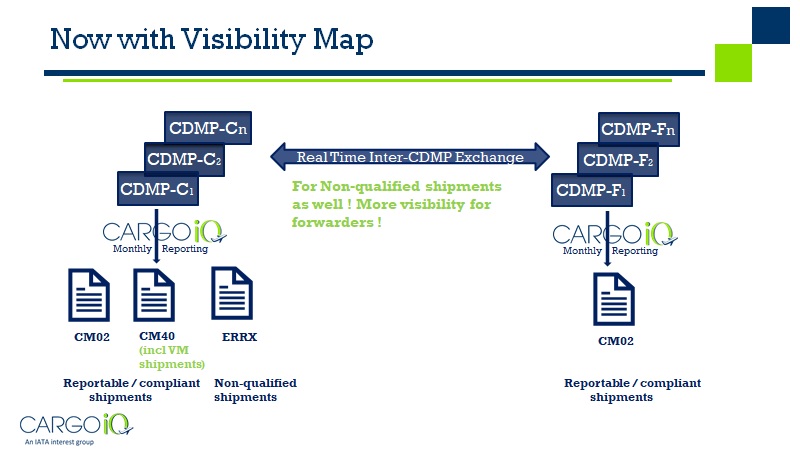Necessity drives changes in air cargo industry
Necessity is said to be the mother of invention and, if nothing else, the Covid-19 pandemic, staff shortages, insufficient air cargo capacity, extended and delayed transit times, low ocean freight capacity, sailing schedules in chaos, and the war in Ukraine have revealed the truly adaptive nature of the air cargo industry.
Covid, particularly among the list above, revealed the overarching urgent need for better transparency and visibility throughout the supply chain.
Apart from the need for adequate storage facilities and proper handling on the ground, specifically geared toward pharma and perishables, there is an obvious need for up-to-date information when temperature-sensitive pharma products are being transported.
But the need for clarity and visibility is not restricted to healthcare and/or food products only.
The request for transparent planning from customers at large stems from the need to plan their own processes, be it the manufacture of semiconductor products or advertising campaigns for fashion items. Even pigments (classed as Dangerous Goods) for the paint producers need to arrive on time, so that paint, and subsequently cars, can be produced.
For pharma shipments, requiring uninterrupted temperature control throughout the supply chain is also vital during the clearance process and transportation after arrival at the destination airport. Full visibility of the processes the shipment is moving through enables the consignee to organize customs clearance, collection from the airport, and onward distribution to pharmacies, hospitals, and ultimately to patients.

Cargo iQ Founded
The demand for better quality in the air cargo industry was voiced by the shipper’s community many years ago. This was the reason for the foundation of Cargo iQ, a not-for-profit membership organization, supported by IATA.
In 1997, members of the newly formed Cargo iQ (then Cargo 2000) began by investigating, analyzing, and improving the various steps an airfreight shipment moved through, from the shipper to the end destination. These steps were documented in a Master Operating Plan (MOP), which was subsequently endorsed by IATA as the recommended practice for the entire air cargo industry.
The implementation of Cargo iQ’s MOP meant that stakeholders had clear information enabling them to plan the movement of a shipment and to know when a shipment was due to become their responsibility. Knowing the exact schedule of the physical movement of the cargo enabled stakeholders to plan their resources, be it technical equipment or manpower.
Technically, it is possible to provide the customer with access to this plan in advance of the actual movement of the shipment, so the requested visibility can be provided.
The MOP has been in existence for years now and it is a mandatory, standard feature for forwarders and airlines within the Cargo iQ organization.

Data analysis
The verification of an actual movement against the planned movement generates data for all respective parties. Analysis of this data was the first step in improving the quality of the process, and all our members have subscribed to this data sharing.
Now, data is also being used to create benchmark reports within the membership, and true quality comparisons based on objective data are being created and published.
Cargo iQ has also established a meaningful Quality Management System for its members. At regular intervals, Cargo iQ members are audited by external specialists, to validate that the member has a solid Quality Management system within their own organization and is adhering to all Cargo iQ specifications. Only a successful audit will grant a Quality Certificate to the member.

Next steps
Cargo iQ is now working on a system to enhance the pure process-orientated route map, which monitors the journey of a shipment, with an additional feature called Care Mapping. This will enable shippers, forwarders, airlines, and ground handlers to plan for specific shipment-related requirements.
For example, a pharma shipment might be routed – based on GDP (Good Distribution Practice) lane validation proposal – via a transit airport in a very warm country. By applying the Care Mapping feature, the shipper would book with the forwarder/airline a specific pharma product and could at the same time request specific “Care” features, such as “re-icing at transit airport”, “storage in cold store at 2° C – 8° C”, or whatever specific requirement there is for the shipment at a specific location and/or while on board the transport vehicle.
Cargo iQ is also working on enhancing Route planning possibilities to create a seamless link between the offline/online stations of airlines, served by Road Feeder Service (RFS). We are looking specifically at the information and messaging exchange between the driver, the trucking company’s base, and the airline. We are about to start a pilot to test the milestone requirements and the ideal messaging standards to close the communication gap between these parties.
As soon as the pilot phase has been concluded, the members of Cargo iQ will be in an excellent position to provide their pharma customers with truly professional logistics solutions at very high quality levels, including the transparency and visibility which are, rightfully, in such high demand.
Cargo iQ is the quality-orientated organization where all members are working hand-in-hand towards improving the quality of the air cargo industry. Quality is what the customers are asking for and that is what our members are offering – in particular, where sensitive products such as pharma require CAREful handling.

Similar Stories
JAS Worldwide signs SPA with International Airfreight Associates B.V.
JAS Worldwide, a global leader in logistics and supply chain solutions, and International Airfreight Associates (IAA) B.V., a prominent provider of comprehensive Air and Ocean freight services headquartered in the…
View Article
LATAM is once again part of the Dow Jones Sustainability Index
View Article
BeyondTrucks streamlines EDI transaction management processes with Orderful partnership
View Article
CPaT partners with Wizz Air, Europe’s leading ultra-low-cost airline, to enhance aviation training
View Article
Air Transat takes off to Tulum from Montreal and Quebec City
View Article
Air France KLM Martinair Cargo achieves record online sales and accelerates commercial transformation
View ArticleGet the most up-to-date trending news!
SubscribeIndustry updates and weekly newsletter direct to your inbox!





